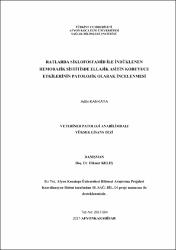Ratlarda siklofosfamid ile indüklenen hemorajik sistitisde ellajikasitin koruyucu etkilerinin patolojik olarak incelenmesi
Abstract
Siklofosfamid tümör tedavisinde yaygın olarak kullanılan bir kematerapötik ajandır. Tedaviyi takiben olguların çoğunda HS ve zaman zaman da mortalite görülmektedir. CP’e bağlı yan etkileri önlemek için Mesna kullanılır. Ancak, bu ajanın da bir takım yan etkileri bulunmaktadır. Bu çalışmada, damar ve epitel koruyucu özellikleri ortaya konmuş olan EA, CP’in yan etkilerine karşı alternatif bir tedavi olarak incelenmiştir.
Çalışmada kullanılan hayvanlar (49 adet, erkek Sprague Dawley rat) 7 gruba ayrılmıştır. Kontrol grubuna GG yolla sadece fizyolojik tuzlu su verilmiştir. CP grubu İP yolla 150 mg/kg CP’e maruz bırakılmıştır. CP+Mesna grubu İP yolla 150 mg/kg CP ve ayrıca, CP’den 20 dakika önce, CP’den 4 ve 8 saat sonra Mesna uygulamasına maruz bırakılmıştır. Diğer dört grup deney grupları olarak ihdas edilmiş ve aşağıdaki protokoller uygulanmıştır. CP+EA50 ve CP+EA75 gruplarındaki hayvanlara İP yolla 150 mg/kg CP ve CP’den 20 dakika önce ve takip eden 4 ve 8’inci saatlerde sırasıyla 50 mg/kg ve 75 mg/kg üç doz EA verilmiştir. Son iki deneme grubuna da bir önceki protokol uygulanmış, fakat sadece ilk EA uygulaması Mesna ile değiştirilmiştir.
Mesna ve EA+Mesna kombinasyonlarına göre biraz daha zayıf kalmakla birlikte EA’in tek başına uygulandığı gruplarda CP grubuna göre mesane histopatolojisinin oldukça korunmuş olduğu gözlenmiştir. Histopatolojik bulguların TAS ve TOS sonuçları ile de uyumlu olduğu izlenmiştir. Elde edilen bu bulgular ışığında EA’in HS’i önlemede destekleyici bir ajan olabileceği kanaatine varılmıştır. Cyclophosphamide is a widely used chemotherapeutic agentin the treatment of tumors. Following treatment, HS and occasional mortality are seen in the majority of cases. Mesna is used to prevent side effects related to CP, but this agent also has some side effects. In this study, EA, whose vascular and epithelial protective properties have been demonstrated, has been investigated as an alternative treatment against side effects of CP.
The animals used in the study (49 male Sprague Dawley rats) were divided into 7 groups. Only physiological saline solution was administred to the control group via the GG route. The CP group was exposed to 150mg/kg CP by IP route. The CP+Mesna group was exposed to 150mg/kg CP by IP route, and also a total of three Mesna administrations 20 minutes before CP, and 4 and 8 hours after CP. The other four groups were established as experimental groups and the following protocols were applied. Animals in the CP+50 and CP+75 groups were received to 150mg/kg CP by IP route at the beginning of the study and also a total of three EA administrations, 20 minutes before CP, and 4 and 8 hours after CP with 50 mg/kg and 75 mg/kg dose, respectively. For the last two experimental groups, the previous protocol was applied, but only the first EA application was replaced with Mesna.
It was observed that bladder histopathology was highly conserved in the EA alone groups compared to the CP group, while being slightly weaker than the Mesna and EA+Mesna combinations. Histopathological findings were also consistent with TAS and TOS results. These findings have led to the conclusion that EA may be a supporting agent in the prevention of HS.
Collections
- Yüksek Lisans Tezleri [635]



















